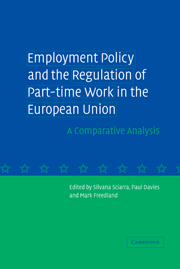Book contents
- Frontmatter
- Contents
- List of figures and tables
- Notes on contributors
- Preface
- List of abbreviations
- PART I
- 1 New discourses in labour law: part-time work and the paradigm of flexibility
- 2 The European Employment Strategy and the regulation of part-time work
- 3 The role of EU employment law and policy in the de-marginalisation of part-time work: a study in the interaction between EU regulation and Member State regulation
- PART II
- Index
1 - New discourses in labour law: part-time work and the paradigm of flexibility
Published online by Cambridge University Press: 30 July 2009
- Frontmatter
- Contents
- List of figures and tables
- Notes on contributors
- Preface
- List of abbreviations
- PART I
- 1 New discourses in labour law: part-time work and the paradigm of flexibility
- 2 The European Employment Strategy and the regulation of part-time work
- 3 The role of EU employment law and policy in the de-marginalisation of part-time work: a study in the interaction between EU regulation and Member State regulation
- PART II
- Index
Summary
The centrality of comparative labour law in the open method of co-ordination
In deciding to undertake collective research on the regulation of part-time work, the authors of the present book agreed on a few methodological claims.
One had to do with the urgent need to revisit a long-lasting comparative tradition in European labour law and to do so from the new perspective of an ongoing process of integration in the European Union. Implicit in this choice was the equally strong urgency to confirm the centrality of a legal discipline – labour law – in the current debate on the European Employment Strategy (EES) and in the many concurring ways of implementing it.
The need to uncover a disciplinary point of view just at the time when EU institutions are developing a culture of co-ordination of all existing processes of integration – economic, structural and to some extent social – is due to the deeply rooted conviction that there is – and should continue to be – a specificity of legal analysis in this particular field.
In ascertaining the contribution of comparative law to labour law, Gerard Lyon-Caen wrote at the end of the 1960s that labour law ‘was born comparative’, because it aimed at providing answers to similar needs and aspirations inherent in the industrialised world. Solutions found in different legal systems were ‘spontaneously analogous’ at least as far as their purposes were concerned.
- Type
- Chapter
- Information
- Employment Policy and the Regulation of Part-time Work in the European UnionA Comparative Analysis, pp. 3 - 34Publisher: Cambridge University PressPrint publication year: 2004
- 2
- Cited by

